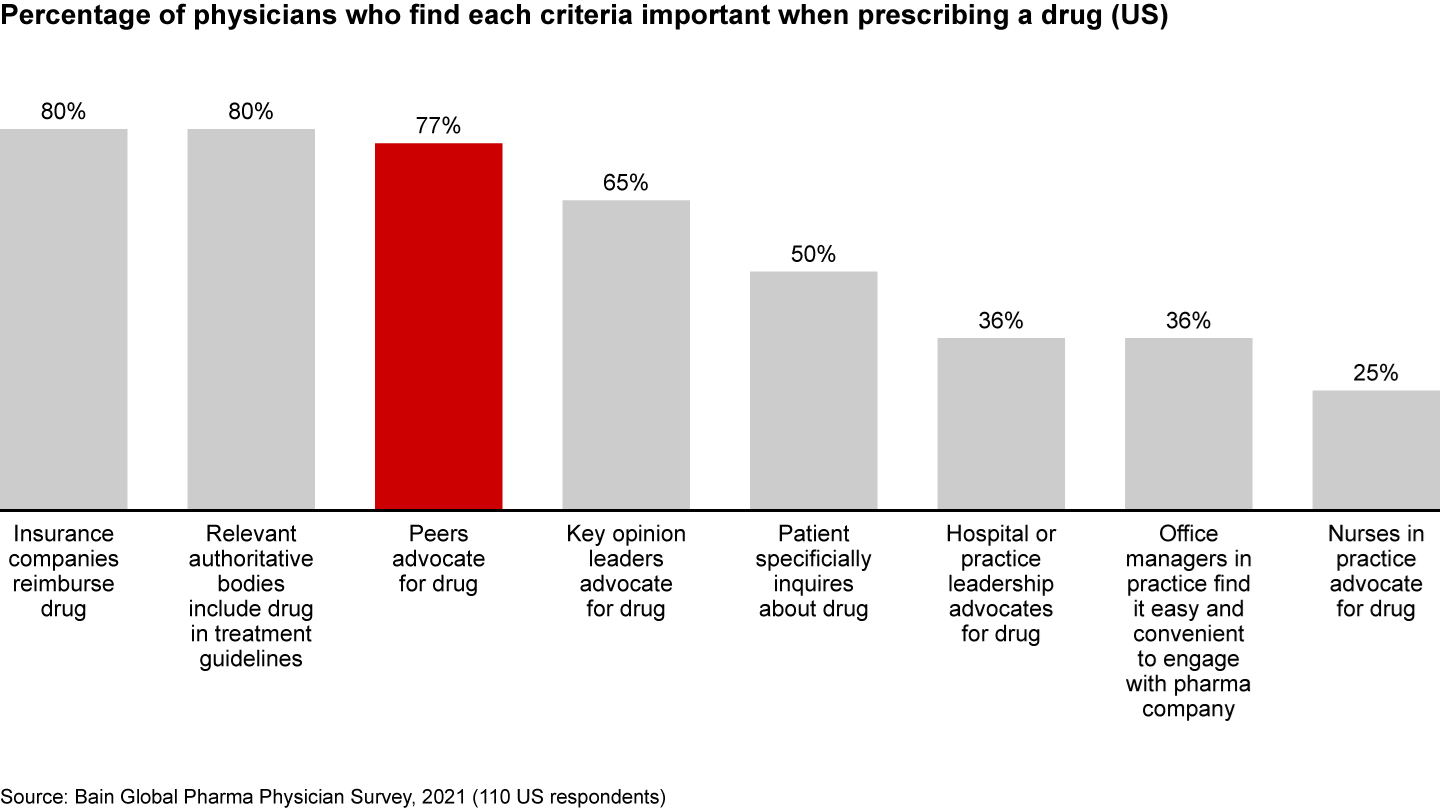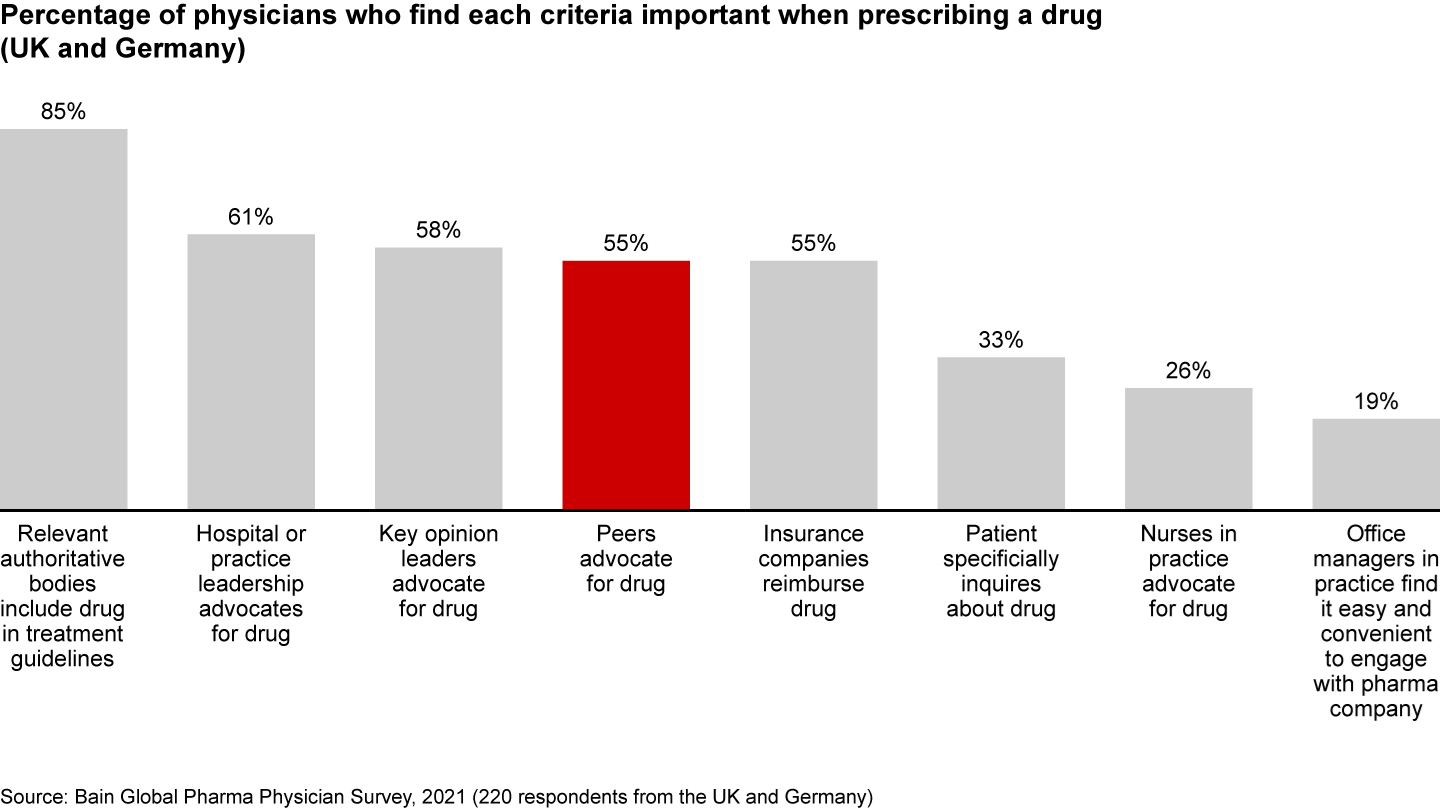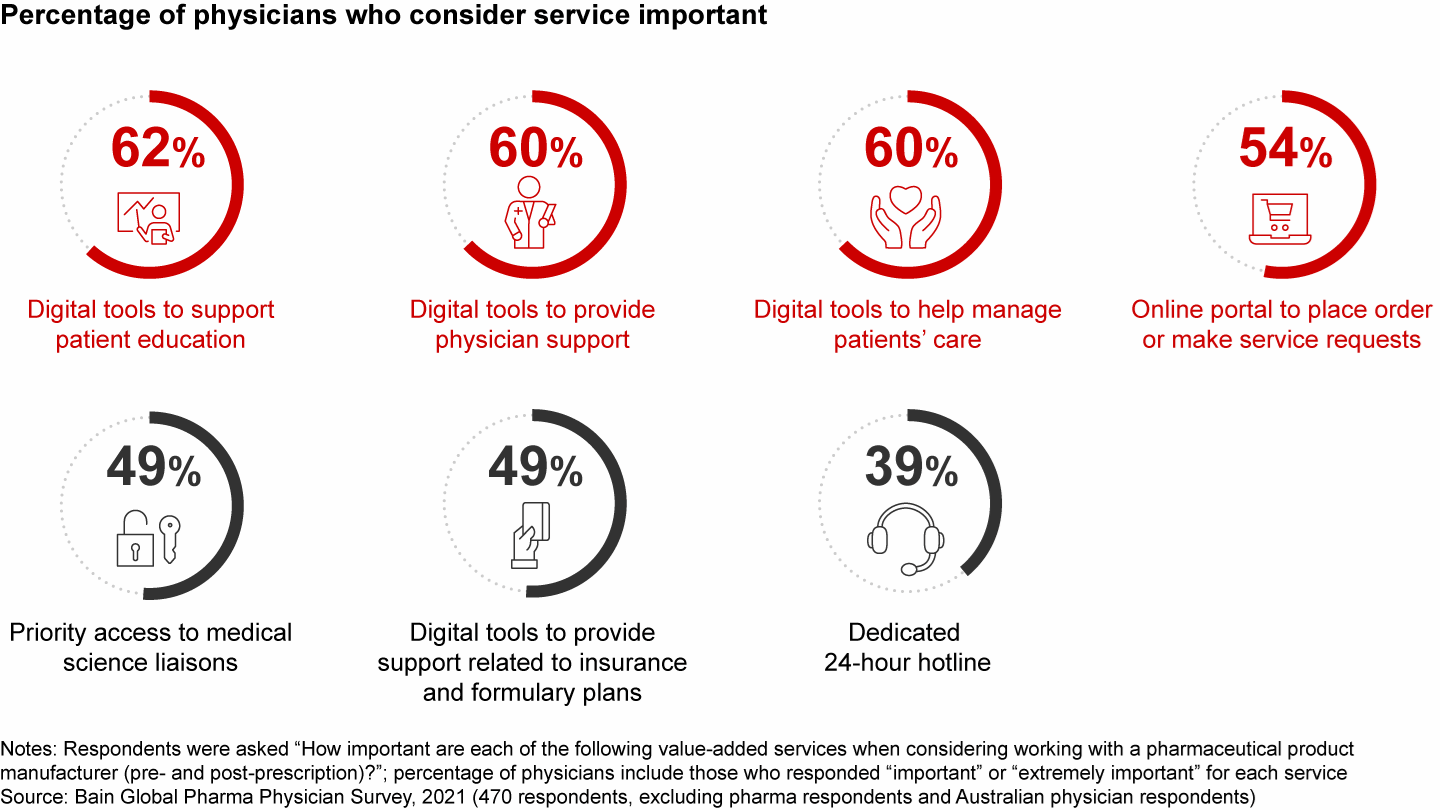Brief

Few pharmaceutical companies have uncovered the key to capturing the full potential of their products: physician advocacy.
Bain’s recent global survey reveals that peer advocacy is one of the top influencing factors in physicians’ prescribing decisions. In fact, it’s on par with the table stakes of insurance companies reimbursing the drug and relevant authorities including the drug in their treatment guidelines.
According to our survey, in the US, 77% of prescribers say that peer advocacy plays a significant role in their treatment selection compared with 80% citing reimbursement and inclusion in guidelines (see Figure 1a). More than half of European physicians also hold peer advocacy in high regard (see Figure 1b).
For US physicians, peer advocacy is one of the most important factors in prescribing decisions


European physicians also place heavy importance on peer advocacy


How can pharma companies generate peer advocacy? We’ve previously found that 40% of physician advocacy for drugs is directly linked to customer experience and loyalty.
And yet, when it comes to customer experience, most pharma sales representatives are flying blind. Our survey results indicate a fundamental gap between what sales reps think doctors want from them and what doctors truly want from them, with sometimes a two- to threefold difference between how sales reps perceive the value of their roles and how physicians actually value those roles (see Figure 2).
Sales reps vastly overestimate physician appetite for some services while failing to recognize the value of others
While both parties are aligned on physicians’ basic needs, sales reps vastly overestimate the appetite for certain services. Many believe they add value by providing educational materials and identifying new patient opportunities, but doctors see the most value in reps who provide trend data, facilitate patient support, and introduce them to other experts.
In other words, the roles that physicians value can significantly diverge from the traditional sales rep job description and incentives, which often focus solely on demand generation. These findings remain steady across countries and specialties, confirming a widespread trend: Doctors want customer relationship managers who they can “pull” on to help build frictionless practices; they don’t need sales reps who “push” products and take up their time.
To close the growing chasm between sales reps and physicians, meet new preferences, and boost advocacy, pharma companies will have to overhaul their commercial models—or face a mounting struggle to deliver growth.
The call for customer centricity
In many other industries, companies have started to place the customer at the center of the commercial model, using a more sophisticated, data-informed approach, yet few pharma companies have cracked the code. The traditional volume-based sales play has been a burden on physicians for some time now, inundating them with sales and marketing messages across channels. Covid-19 struck the final blow, straining the system, overwhelming physicians, and leading practices to further restrict access.
Even when the crisis eases, the situation is unlikely to change, permanently tipping the balance of the physician-rep relationship. The next generation of industry-leading pharma companies will be those that help physicians serve patients through a seamless, hassle-free experience. With a customer-centric approach, they will create loyal customer advocates and ultimately win outsize market share.
But achieving the level of sophistication required to succeed won’t be easy. It often requires a full transformation of the commercial model. Pharma companies can get started by fundamentally shifting their mindsets, boosting their skill sets, and building up their toolkits.
The mindset
To address the dissonance between physicians’ and sales reps’ notions of value-added services, sales reps will need to shift from a self-oriented mindset to a customer-oriented one. Currently, more than half of sales reps believe that cultivating a personal relationship with physicians is one of their most important roles, yet only 29% of doctors find a personal relationship valuable (see Figure 3).
Pharma companies have a clear opportunity to take a more customer-centric approach to physician interaction
Instead, doctors care about services that lighten their loads and assist them in meeting patients’ needs. They want pharma companies to provide the linkages to patient support programs and to make their lives easier through access to a single source of content.
Similarly, too many sales reps overlook quick-win opportunities that could help them become more customer centric. For instance, doctors are 12.5 times more likely than sales reps to cite faster response times as a key opportunity for pharma companies to add value.
The skill set
To deliver on a customer-centric mindset, pharma companies will need to foster a set of integral skills in their customer engagement managers. The best customer engagement managers will ensure coordination across patient managers, access managers, and medical science liaisons to better serve customers. These different roles will need to work together as a cohesive unit to deliver integrated account management.
In addition, top companies will spur innovation through centralized groups that equip the field with digital tools, data-based insights, and codified lessons from across siloes within the broader organization.
The toolkit
Pharma companies will also need to equip their field force with the appropriate digital tools. Artificial intelligence–integrated customer relationship management, patient and physician portals, digital companion apps, and predictable reimbursement are rapidly becoming minimum requirements for competition. Winning pharma companies will use data- and analytics-based platforms to convey the right messages to the right customers at the right times.
Moreover, the demand for digital services that help doctors support patients is growing: Around 60% of healthcare providers now say that digital tools to support patient education, provide physician support, and manage patient care are important when they consider working with a pharma product manufacturer (see Figure 4).
Physicians want value-added digital services


Underlining the burgeoning opportunity in this space, investments in commercialization support services skyrocketed in 2020. Harvest Partners invested in ConnectiveRx (formerly PSKW), a provider of technology-enabled patient support and adherence services for specialty and branded biopharma manufacturers. We expect the flurry of deal activity to continue over the coming years.
Beyond digital tools, leading companies also will build speed and repeatability into their commercial toolkits. In some organizations, for instance, it could make sense for a central group to develop a library of compliant, preapproved content. Reps can quickly pull this concise, snackable content off the shelf for any given situation, circumventing lengthy approval processes.
A commercial model transformation won’t happen overnight. The winning model of the future will be dynamic and iterative. Once they’ve set the changes around the organization’s mindset, skill set, and toolkit in motion, leading pharma companies will install systems to constantly keep their finger on the pulse of doctors’ wants and needs. They will evolve their commercial model accordingly to delight prescribers, support the best patient outcomes, and achieve sustained growth.